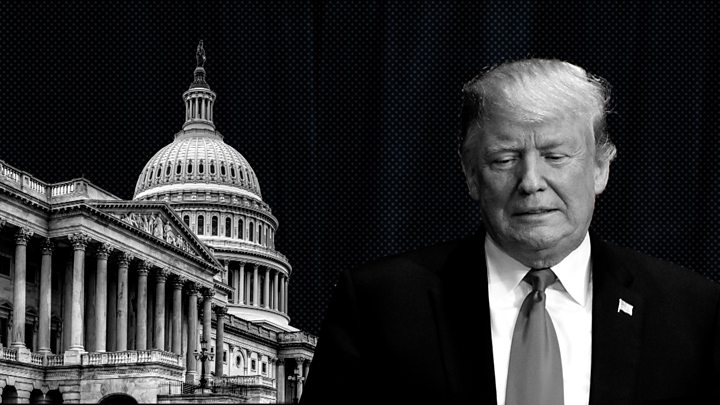Trump impeachment inquiry: A simple guide
US President Donald Trump is facing a process that could eventually see him removed from office.
It all centres on whether or not he improperly sought help from Ukraine to boost his chances of re-election in 2020.
Things are still at an early stage. The first public hearings are due to start on Wednesday in the lower house of Congress, the House of Representatives. That is controlled by the Democrats. President Trump, who is a Republican, strongly denies any wrongdoing.
Depending on what happens in the next few weeks, Mr Trump could end up facing impeachment – but more on what that means below.
What is he accused of doing wrong?
President Trump is accused of pressuring Ukraine’s President Volodymyr Zelensky to dig up damaging information on one of his main Democrat challengers, Joe Biden, and his son Hunter.
Hunter worked for a Ukrainian company when Joe Biden was US vice-president.
Asking foreign entities for help in winning a US election is illegal.
What is the evidence?
At the heart of the story is a complaint from a whistleblower – an unnamed intelligence official – who wrote a letter expressing concern about Mr Trump’s 25 July call with Mr Zelensky.
A rough transcript of the call revealed that Mr Trump had urged President Zelensky to investigate discredited allegations against Joe and Hunter Biden.
The call came shortly after Mr Trump had blocked the release of millions of dollars in US military aid to Ukraine. A senior official later testified that the president made clear the release of the aid was conditional on Mr Biden being investigated, but the White House denies this.
What is his defence?
Mr Trump denies using US military aid as a bargaining chip with Mr Zelensky and has repeatedly insisted his call with Ukraine’s leader was “perfect”.
He has called the impeachment inquiry a “witch hunt” by Democrats and elements of the media.
What is impeachment anyway?
To impeach, in this context, means to bring charges in Congress that will form the basis for a trial.
The US constitution states a president “shall be removed from office on impeachment for, and conviction of, treason, bribery, or other high crimes or misdemeanours”.
What is the process?
It happens in two stages. Proceedings have to be started by the House of Representatives.
A vote to impeach only needs a simple majority to pass and if it does, the process then moves to the Senate where a trial is held.
But here, a two-thirds vote is necessary for a president’s removal – and this milestone has never been reached in US history.
The Senate is currently controlled by the Republican Party.
Have other US presidents been impeached?
Bill Clinton found himself impeached on the grounds of perjury and obstruction of justice after he lied about the nature of his affair with Monica Lewinsky and then allegedly asked her to lie about it as well.
But when the trial reached the Senate in 1999, the vote for a conviction failed to get close to the two-thirds backing required.
The only other president impeached was Andrew Johnson in 1868. He was accused of, among other things, dismissing his secretary of war against the will of Congress. Mr Johnson had a narrow escape – the two-thirds majority in the Senate was missed by just one vote.
Richard Nixon, the 37th US president, resigned in 1974 before he could be impeached over the Watergate scandal.
Who would replace Trump?
The line of succession for the US government, as established by the Presidential Succession Act of 1947, would mean Vice-President Mike Pence moving into the Oval Office.
Learn more about impeachment inquiry
Source: Read Full Article




